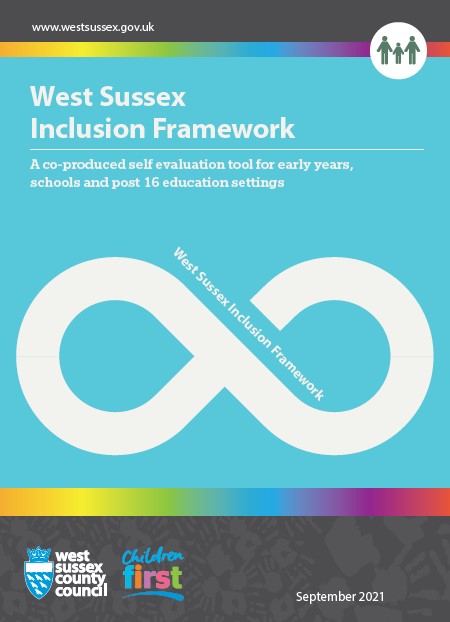
West Sussex Inclusion Framework September 2021 doc
Is there evidence that…
- Positive relationships support all members of the school community and shared values are understood by all.
- All children and young people (CYP) feel individually valued and known.
- Personal strengths are recognised within day to day school life.
- The school counters all forms of discrimination.
- The school curriculum is reflective of CYP needs and provides a universal curriculum for all CYP to develop all areas of relationship education.
- Staff need to be challenged and reflective to teach a diverse curriculum, such as teaching history from different perspectives.
- To teach a diverse curriculum, staff need to be challenged and reflective.
Discussion prompts / evidence of impact
- The school has developed an understanding of the culture of its local community and can demonstrate how it uses this knowledge to meet the needs of its CYP and their families. For example: facilitating cultural events and festivals to celebrate different customs, food, dress, dance etc. The views of parents from all community groups are sought to improve accessibility and equality of opportunity.
- A whole school approach to Education for Safeguarding (such as WSCC Education for safeguarding (E4S)) is clearly evident and facilitation of learning is effective in meeting the needs of the school community.
- CYP show they have a real understanding of different viewpoints and feel able to positively challenge others’ language or behaviour and understand why they need to do this. They show respect for the different protected characteristics defined in law and no forms of discrimination are tolerated.
- Staff are supported to challenge each other when stereotypical views are perpetuated. Acknowledging that even if the offence caused may not have been intentional, actions are still taken to redress the situation and allow the staff member to grow.
- The staff room as well as the classroom is part of the school community therefore the same expectations apply, there is no room for “banter” that causes offence to anyone in the school community, whether they are present or not.
- Systems and procedures for celebrating success are highlighted within the positive behaviour policy or equivalent, which is informed by a therapeutic approach and consistently used across the school. Quantitative evidence shows that success and positive incidents are being recorded and reported more frequently than negative indicators.
- Success, both in and out of school, is acknowledged and celebrated in a way that is supportive to CYP. CYP have trusted relationships with staff which enables them to have confidence to demonstrate and develop their skills within different contexts.
- Parents are routinely contacted regarding their child’s success including effort, progress, academic and wider achievements. Parents form part of the celebration of success.
- There are well known and clear school wide procedures for dealing with, and reporting, issues and incidents of discrimination and harassment, including homophobia, racism, sexism, disability, religion. These are also reflected in the curriculum. CYP have trust in staff and have positive supportive conversations with them.
- The curriculum is a vehicle to promote the CYP’s understanding of cultural diversity. Schools that are predominantly monocultural make an even greater proactive effort to ensure their CYP have a greater understanding of the world, in order that they leave school with balanced, well-informed and non-stereotypical views. CYP are supported to be empathic, thoughtful and curious about experiences and perspectives that are different to those they are more familiar with.
- The school can provide evidence that incidents of bullying, harassment or hate crime have been used as opportunities to develop understanding and to promote better relationships within the school community.
- There are opportunities for CYP from diverse backgrounds, contexts and needs to learn from each other and together.
Last updated 16 August 2021
 Tools for Schools
Tools for Schools